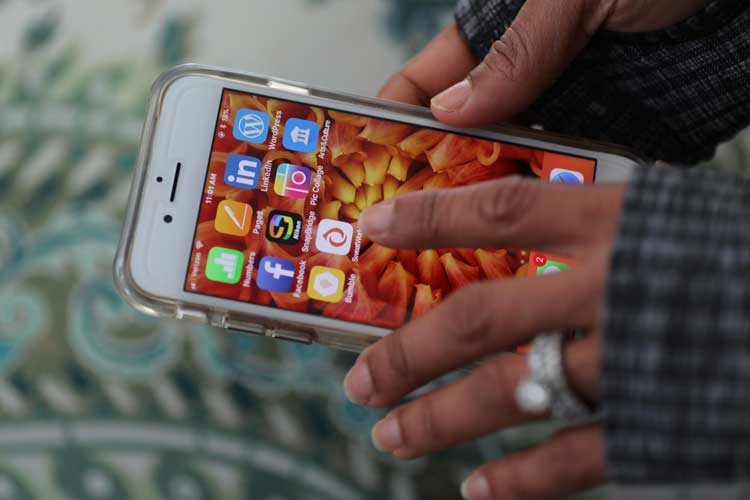
As a new mom and blogger, I feel like my life revolves around baby, baby, baby, screen time, baby, screen time. It often leads me to ask the important question: how much is too much screentime for either one of us? We Facetime with our family often and now that CJ is learning and growing, he is more and more enamoured with the tiny computer always at my fingertips. We are extremely limited in our TV consumption with him and really engage in books, toys and music during his wake times, but with the onset of technology, sometimes you cannot help but let screens become a natural part of your daily interactions.
After speaking to my friends from Baptist Health South Florida and watching this Facebook Live, I learned a lot about screen time and the impact it has on children and adults. As I sit here this very moment and feel my eyes getting tired and my shoulders slumping forward from too much time at the computer, I have a sense of gratitude to be able to work from home and have the opportunity to move around during the day. With that said, I need to find time to put my phone and computer down more often because I do feel like my limited ability to concentrate and strained eyes are from constant use of my computer and phone.

If you have children who love video games or watching YouTube on your phone, then you definitely should watch this entire Facebook Live or read this article, but to summarize some key points to help you develop your own screen time rules, I thought I would share some thoughts from the experts. According to this article, the latest report, published in the journal JAMA Pediatrics this week, focuses on toddlers. It found a direct association between screen time at ages 2 and 3 and potential issues with development at 3 and 5. Development includes progress in language, communication, motor skills and “socio-emotional health,” researchers said.
By the time they start school, a quarter of children show some deficiency or delay in these development skills, including communicating, the report states. “Thus, many children are beginning school inadequately prepared for learning and academic success,” the study says. A 60 Minutes report on CBS last month revealed that a $300 million study is following 11,000 children at 21 testing sites across the country to evaluate how screen time is affecting their brain development and mental health.
According to the article, Sergio Jaramillo, M.D., a neurologist with Baptist Health Neuroscience Center, states that there is so much data out there and counting because this is such an important topic. I have even heard the saying that “cell phones will be the cigarettes of our generation”. Not only have these studies shown how extensive screen use, (7 hours per day) impact significant changes in brain development, but there are major physical effects. Too much time on digital devices “really affects so many aspects of our health,” stresses Amy Exum, a psychotherapist for Care and Counseling Services at Baptist Health South Florida.

“Spending extended periods of time on a tablet, phone or laptop — that probably means we’re not getting outside, we’re not exercising and we’re staying sedentary, which is not a good thing,” says Ms. Exum. “We’re also not getting those important social interactions, such as making eye contact with someone or greeting someone (in person) beyond what is happening behind the screen (of a digital device).” Personally, I would stop to truly consider how screen time effects you and your families life and take baby steps to find balance. To help you I have shared recommendations from the AAP and a few tips to help you and your family limit screen time together.
The American Academy of Pediatrics (AAP) has set the following guidelines for “daily screen time” for kids on electronic devices.
- For children younger than 18 months, avoid use of screen media other than video-chatting. Parents of children 18 to 24 months of age who want to introduce digital media should choose high-quality programming, and watch it with their children to help them understand what they’re seeing.
- For children ages 2 to 5 years, limit screen use to 1 hour per day of high-quality programs. Parents should co-view media with children to help them understand what they are seeing and apply it to the world around them.
- For children ages 6 and older, place consistent limits on the time spent using media, and the types of media, and make sure media does not take the place of adequate sleep, physical activity and other behaviors essential to health.
 Watch Now: Sergio Jaramillo, M.D., neurologist with Baptist Health Neuroscience Center, and Amy Exum, psychotherapist at Baptist Health, discuss “Screen Time and Video Games: Impact on Brain and Mental Health” on Facebook Live.
Watch Now: Sergio Jaramillo, M.D., neurologist with Baptist Health Neuroscience Center, and Amy Exum, psychotherapist at Baptist Health, discuss “Screen Time and Video Games: Impact on Brain and Mental Health” on Facebook Live.
Here is how we are making time to limit screen time in our home:
Schedule time to unplug.
Create a charging station in the house and require everyone to have their phones on it by a certain time.
Take time to read a book and keep your phone out of sight and TV off.
Go for a walk or jog with the family and leave your phones at home or designate one family member only to have a phone just in case of an emergency.
Play a board game
Download an app like Freedom or In Moment to help you curb your social media usage and will offer insights on how you spend time on your phone daily. The new iPhone also has this feature and you will be surprised at how long you are actually getting lost in your scroll.


